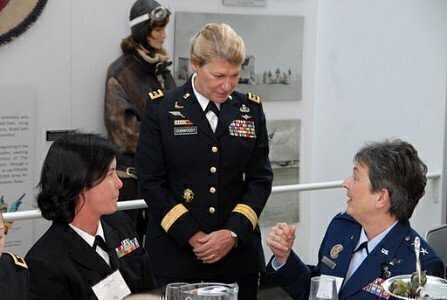Should young women have to register for the selective service draft after Defense Secretary Ashton Carter said in December that women now are eligible for combat positions?
 That has become an increasing popular discussion in society and during the current presidential campaign. Last week, four candidates in the New Hampshire Republican debate tackled the question. And on Wednesday, Senator John McCain said he supported making women draft eligible.
That has become an increasing popular discussion in society and during the current presidential campaign. Last week, four candidates in the New Hampshire Republican debate tackled the question. And on Wednesday, Senator John McCain said he supported making women draft eligible.
And in a poll released on Tuesday by Rasmussen Reports, 52 percent of women opposed the idea of women registering for the draft, while 61 percent of men supported the idea.
About 25 years ago, the Supreme Court considered the issue of women in the draft in a case called Rostker v. Goldberg. The Supreme Court held that it is constitutional to require men, but not women, to register for the draft.
The distinction was justified because combat restrictions on women meant they did not have the same opportunities to be promoted as men. But in December 2015, Secretary of Defense Carter's announcement that women are now eligible for combat positions may have changed the context of that decision.
Also in December, the United States Court of Appeals for the Ninth Circuit heard arguments in a lawsuit brought by the National Coalition for Men, who argue that now that the combat restrictions no longer apply to women, there is no longer a justification for treating men and women differently, and the male-only draft violates the Equal Protection Clause of the Constitution.
A lower court ruled against the Coalition on the grounds that the case is not “ripe” for judicial decision because the policy of lifting combat restrictions is still being implemented, and it is yet to be seen how it will work in practice. The appellate court may hold that the suit may proceed and send it back to the district court, or it may affirm the district court’s judgment that the case is not ripe for judicial review.
Most probably, Congress wouldn’t act to change the draft law until after the current election is over and a new Congress is seated next year. How the Ninth Circuit Appeals court handles the matter could influence the future debate over this issue, especially among lawmakers.
One other note: in that Rasmussen survey, only 29 percent of those polled supported the draft's actual return. The draft lottery was phased out by the end of the Vietnam War.







